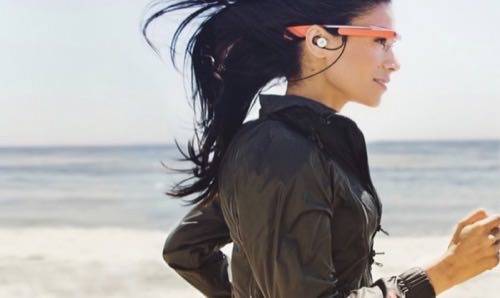
Google Glass, now mostly a data head’s-up display, will soon transform into a headset for streaming music. Which sounds pretty cool, right? Too bad it won’t work, at least with Glass as it’s currently designed.
Streaming music on Glass certainly fits into Google’s chic vision of the future, in which we all bop around from hip parties to the music studio with the company’s biggest hardware experiment ever affixed to our faces (just watch the video!). And believe me, that’s a future I want to be a part of—even if it means buying a leather jacket with a mock collar.
Google Glass will also soon offer sound search, a tool that auto-detects what song is playing to answer the question “OK Glass, what song is this?”—a thing I’d ask Glass approximately two times per year. With Google Play Music, a new voice command will let users queue up their preferred tunes through Google Play Music.
Unfortunately, the news that Glass will add support for Google Play Music, Google’s streaming music service and song storage locker, is putting the cart way, way before the horse. I bought Glass, after all. I want to believe. But unless the second “Explorer Edition” of Google Glass jumps a few lightyears forward in technology, the design is nowhere near there yet.
Say Hello To Data Overages
With Google Play Music for Glass, Google intends for you to stream from your own Google Music account (you have one, right?) and its millions of All Access on-demand songs. But the thing is, streaming music chews through data. And with only 16GB of flash memory for all of your locally stored Glass stuff (photos, videos, etc.), Google certainly expects you to be connecting to its cloud, not storing songs locally.
We did the math with Verizon’s handy data calculator, which we’d image errs on the conservative side. Streaming 2 hours of music per day would consume an estimated 3.52GB of data per month. And remember: there’s been no word of adding 3G/4G connectivity to Glass, so that means you’ll be dipping into your smartphone’s existing data pool. That 3.52GB only represents the data you’ll chew through by streaming music on Glass, not all of the apps you download on your smartphone, YouTube clips you might watch and so on.

If Google has its way and positions Glass as a kind of always-on pair of headphones, Glass-wearers can expect to feel the hurt on their monthly mobile bill. All by itself, that 3.52GB of music would cost you $60 to $70 a month in Verizon data charges.
Battery Life: No Way, No How
The second explorer edition of Google Glass features almost identical hardware to the first. That means Glass 2 sports the same size battery housing as the first edition. Software can improve battery life, sure, and my fingers are crossed that the battery hidden in bulky side of Glass steps up its game. But given the lack of design difference, Glass 2 likely means miserable battery life—my biggest complaint about Glass so far.
Wearing Glass, I use the pop-up notifications (text, email) and the still camera occasionally. Most of the time, it’s in idle mode, awaiting its next deliverable chunk of data. Even sticking to these relatively non-battery intensive features, I’m lucky if I get 4 hours out of it. And with video? Forget it. That battery life numbers slumps down to around two hours, if you’re lucky. Streaming music may be less intensive than recording video (or streaming it, something that Glass doesn’t do), but it’s still going to be a battery hog.
Not to be the requisite curmudgeon, but this whole music thing is an impossible plan. Even if it drums up hype for a wide consumer launch, something that Google might finally be nearing, it can’t deliver.
Can’t we just go back and buckle down on the hardware? This Glass Explorer just wishes that her Glass had a little stamina… I’d be wearing it constantly if the battery would cooperate. And isn’t that want they want? I’ve filled out every feedback survey so far, and I have a hard time imagining that any Explorers were writing in “Google Play Music” in the most requested feature field.
P.S.: If you’re interested in playing around with the new Glassware now, it’s possible to sideload the Google Play Music APK in XE11.
And if you care to join my chorus for reasonable Glass improvements, sign-ups for the Glass waitlist are wide open as of today!

















